If you're a seafood lover in Singapore, you have to try seafood pajeon. This Korean dish is a savoury pancake made with a batter of flour, eggs, and water, mixed with an assortment of seafood such as shrimp, squid, and clams, and green onions. It's a popular dish in Korea, and it's gaining popularity in Singapore as well.
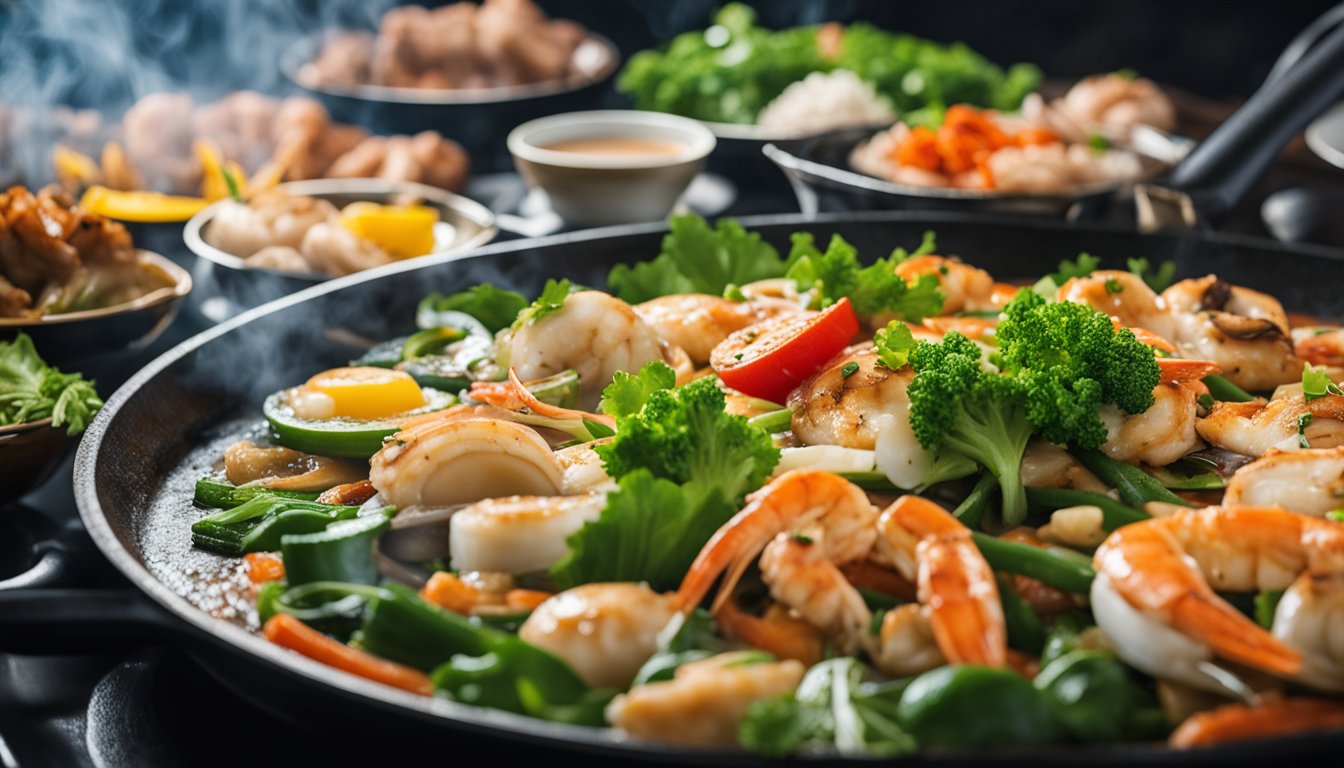
Seafood pajeon is a versatile dish that can be eaten as a snack, appetizer, or main course. It's perfect for sharing with friends and family, and it's a great way to experience Korean cuisine. If you're looking for a delicious and savoury local delight, seafood pajeon is definitely worth a try.
Key Takeaways
- Seafood pajeon is a Korean dish that is gaining popularity in Singapore.
- It's a savoury pancake made with a batter of flour, eggs, and water, mixed with an assortment of seafood such as shrimp, squid, and clams, and green onions.
- Seafood pajeon is a versatile dish that can be eaten as a snack, appetizer, or main course.
Exploring Seafood Pajeon in Singapore
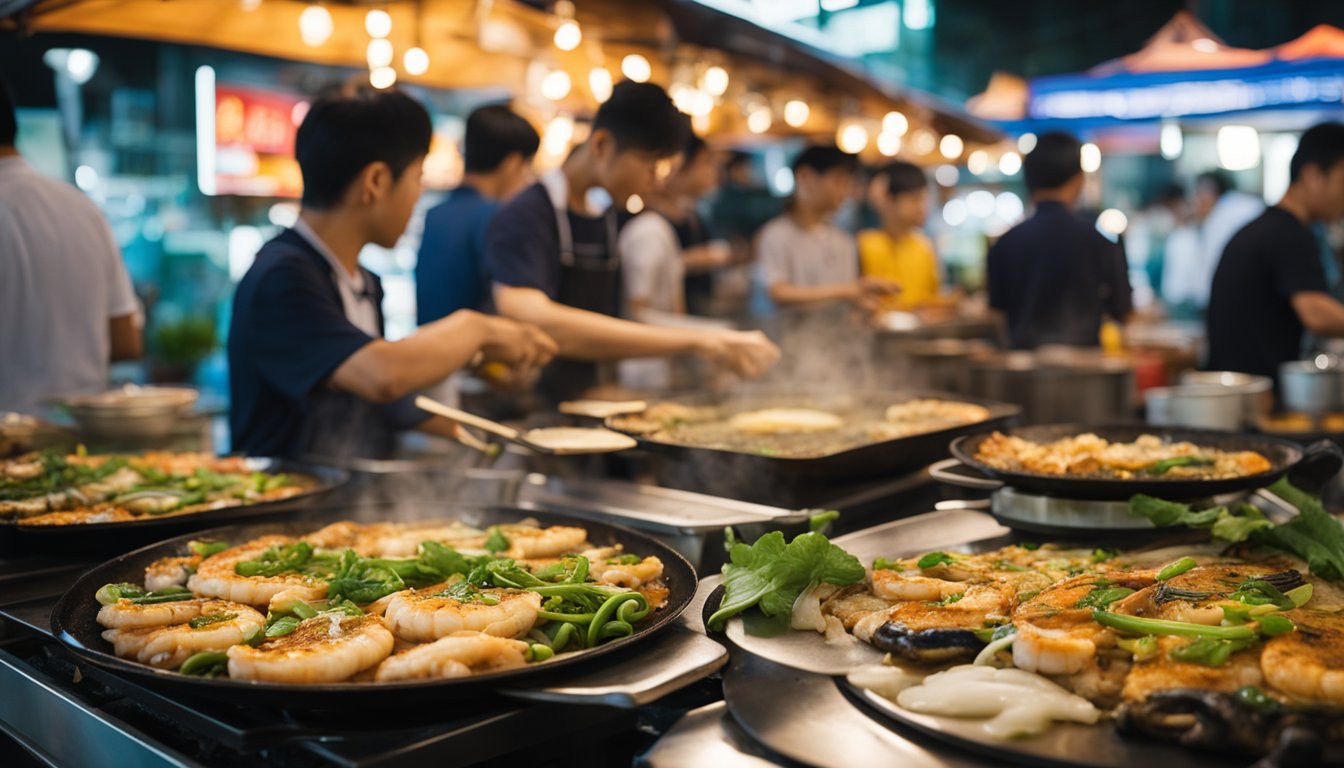
If you're a fan of Korean cuisine, you've probably heard of seafood pajeon. This savoury pancake is a popular dish in Korea, and it has made its way to Singapore as well. In this section, we'll explore the origins and cultural significance of seafood pajeon, as well as some popular spots to try it in Singapore.
Origins and Cultural Significance
Seafood pajeon is a type of Korean pancake that is made with a batter of flour, eggs, and water, mixed with an assortment of seafood such as shrimp, squid, and clams, and green onions. The pancake is then pan-fried until crispy on the outside and soft on the inside.
In Korea, pajeon is a popular dish that is often served as an appetizer or a side dish. It is also a common street food, and it is often enjoyed with a glass of soju. Pajeon is typically served with a dipping sauce made from soy sauce, vinegar, and sesame oil.
Popular Spots for Seafood Pajeon
If you're looking to try seafood pajeon in Singapore, there are several popular spots where you can find this delicious dish. One of the most well-known places to try seafood pajeon is at Kim's Family Food, located in Tanjong Pagar. Here, you can enjoy a variety of Korean dishes, including seafood pajeon.
Another popular spot for seafood pajeon is at Joo Bar, located in Bugis. This Korean bar and restaurant serves up a variety of traditional Korean dishes, including seafood pajeon. The restaurant also has a great selection of Korean drinks, including soju and makgeolli.
If you're looking for a more casual dining experience, you can try the seafood pajeon at Seoul Jjimdak, located in City Square Mall. This Korean restaurant serves up a variety of hearty dishes, including seafood pajeon, which is perfect for sharing with friends and family.
Overall, seafood pajeon is a delicious and savoury dish that is perfect for anyone who loves Korean cuisine. Whether you're in the mood for a casual dining experience or a more upscale meal, there are plenty of great spots to try seafood pajeon in Singapore.
The Art of Making Seafood Pajeon
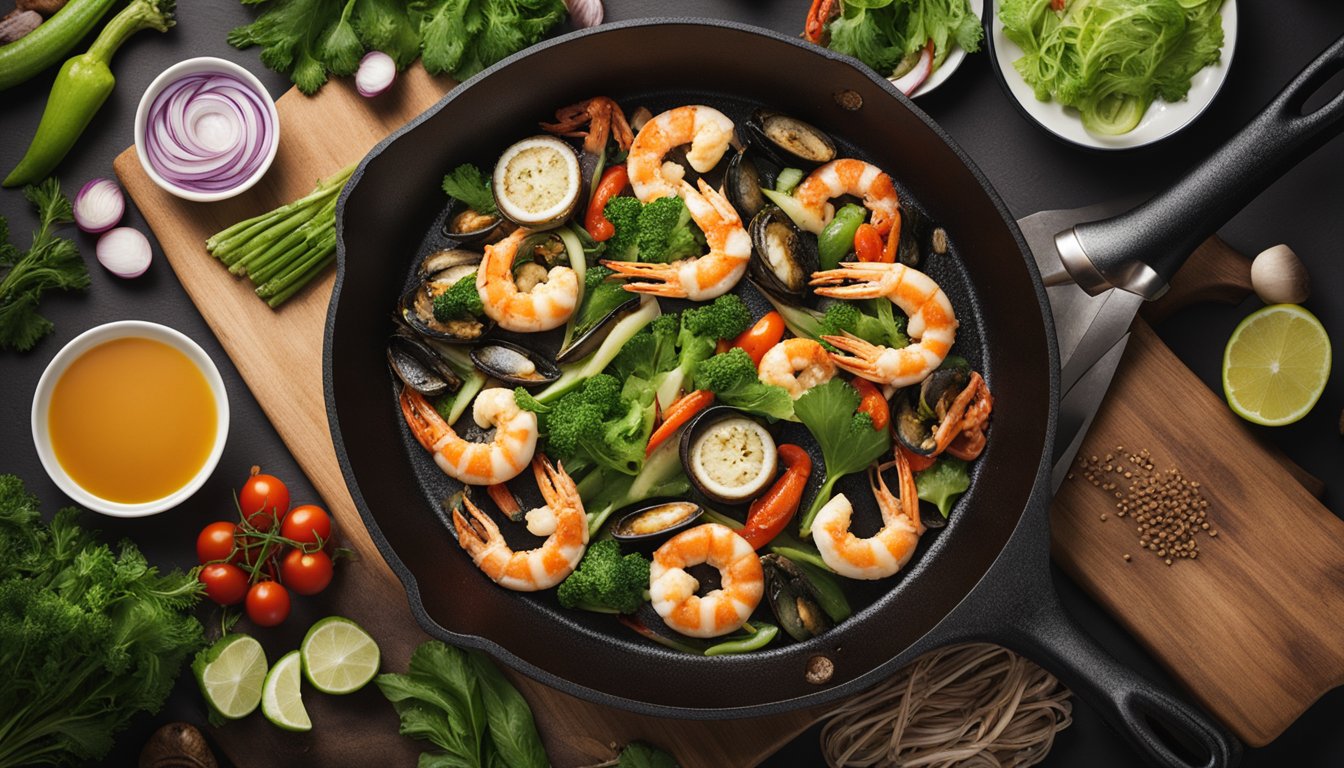
Seafood Pajeon is a popular Korean pancake that has made its way to the streets of Singapore. This savoury pancake is made with a variety of seafood such as shrimp, squid, octopus, or fish, mixed with green onions and a batter made from wheat flour, eggs, and water. It is a delicious snack or appetizer that can be enjoyed by anyone. Here are some tips on how to make the perfect Seafood Pajeon.
Key Ingredients
The key ingredients for making Seafood Pajeon are seafood, green onions, wheat flour, eggs, and water. It is important to use fresh seafood to ensure the best flavour. You can use a combination of shrimp, squid, octopus, or fish, depending on your preference. Green onions are a must-have ingredient as they add a fresh and savoury taste to the pancake.
The batter is made from wheat flour, eggs, and water. The ratio of flour to water is important as it will determine the consistency of the batter. A thicker batter will result in a denser pancake, while a thinner batter will result in a lighter pancake. It is important to mix the batter well to ensure there are no lumps.
Cooking Techniques
The cooking technique is crucial to making the perfect Seafood Pajeon. Here are some tips on how to cook it to perfection.
- Heat a non-stick frying pan over medium-high heat. Add a generous amount of oil to the pan and let it heat up.
- Pour the batter into the pan and spread it out evenly. Add the seafood and green onions on top of the batter.
- Cook the pancake for 3-4 minutes on each side, or until it is golden brown and crispy.
- Serve the pancake hot with a dipping sauce made from soy sauce, vinegar, and chilli flakes.
To make the pancake even more flavourful, you can add other ingredients such as garlic, ginger, or chilli paste to the batter. You can also experiment with different types of seafood or vegetables to create your own unique version of Seafood Pajeon.
In conclusion, making Seafood Pajeon is an art that requires the right ingredients and cooking techniques. With these tips, you can make a delicious and crispy pancake that is perfect for any occasion.
Pairing and Enjoyment
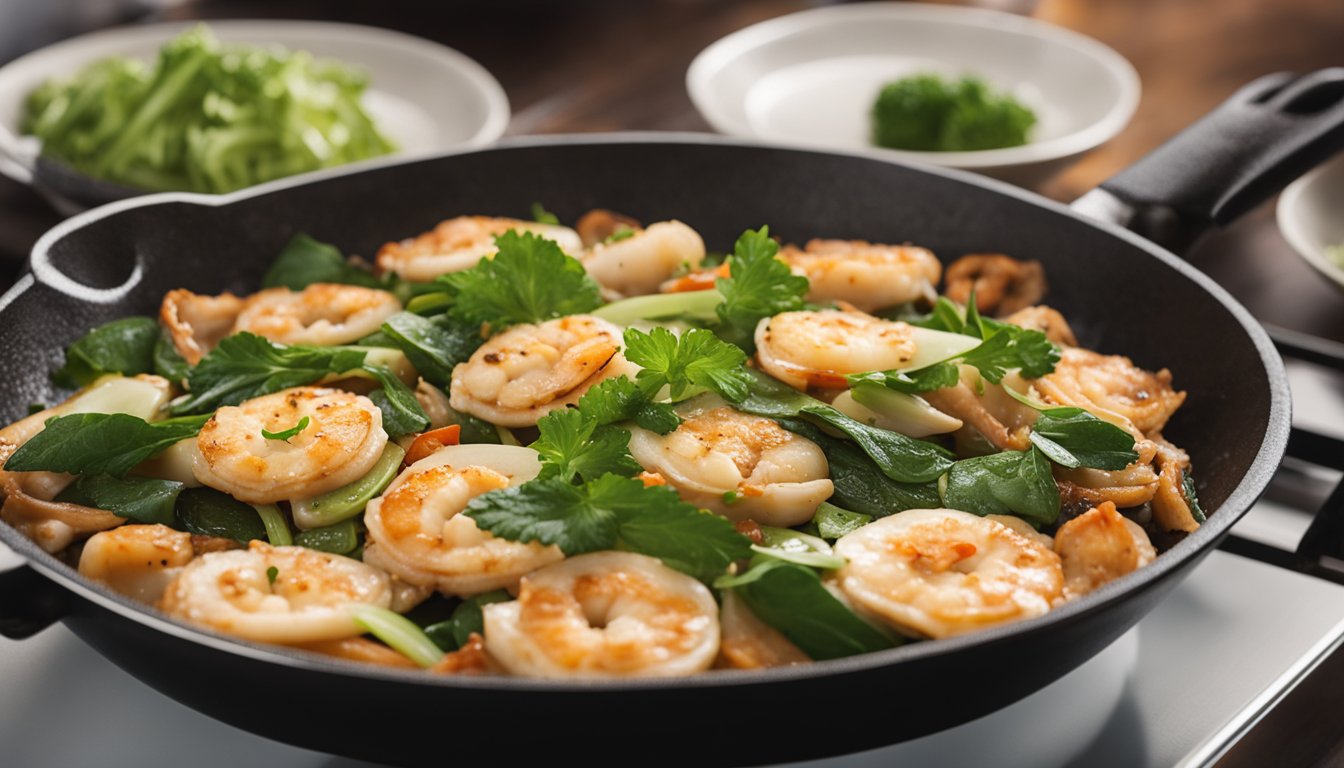
Accompaniments
Seafood Pajeon is a delicious dish that can be enjoyed on its own or paired with a variety of accompaniments. One popular accompaniment is a dipping sauce made with soy sauce, vinegar, and sesame oil. The tangy and slightly sweet flavour of the sauce complements the savoury and crispy pancake perfectly. You can also try pairing your seafood pajeon with pickled vegetables such as kimchi or radish for a refreshing contrast in taste and texture.
Another great accompaniment for seafood pajeon is a bowl of hot and sour soup. The soup's tangy flavour and spicy kick can help balance out the richness of the pancake. A bowl of steamed rice can also be a great addition to your meal, especially if you want to make it more filling.
Beverage Pairings
When it comes to beverage pairings, there are several options that can complement the flavours of seafood pajeon. One classic choice is a cold beer, which can help cut through the richness of the pancake and refresh your palate. You can also try pairing your pancake with a glass of chilled white wine such as Sauvignon Blanc or Pinot Grigio. The wine's acidity and fruity notes can help enhance the seafood flavours in the pancake.
If you prefer non-alcoholic beverages, you can try pairing your seafood pajeon with a cup of hot tea. Green tea or oolong tea can be great choices as they have a subtle flavour that won't overpower the pancake. Alternatively, you can opt for a glass of iced tea or lemonade for a refreshing and thirst-quenching beverage.
Frequently Asked Questions
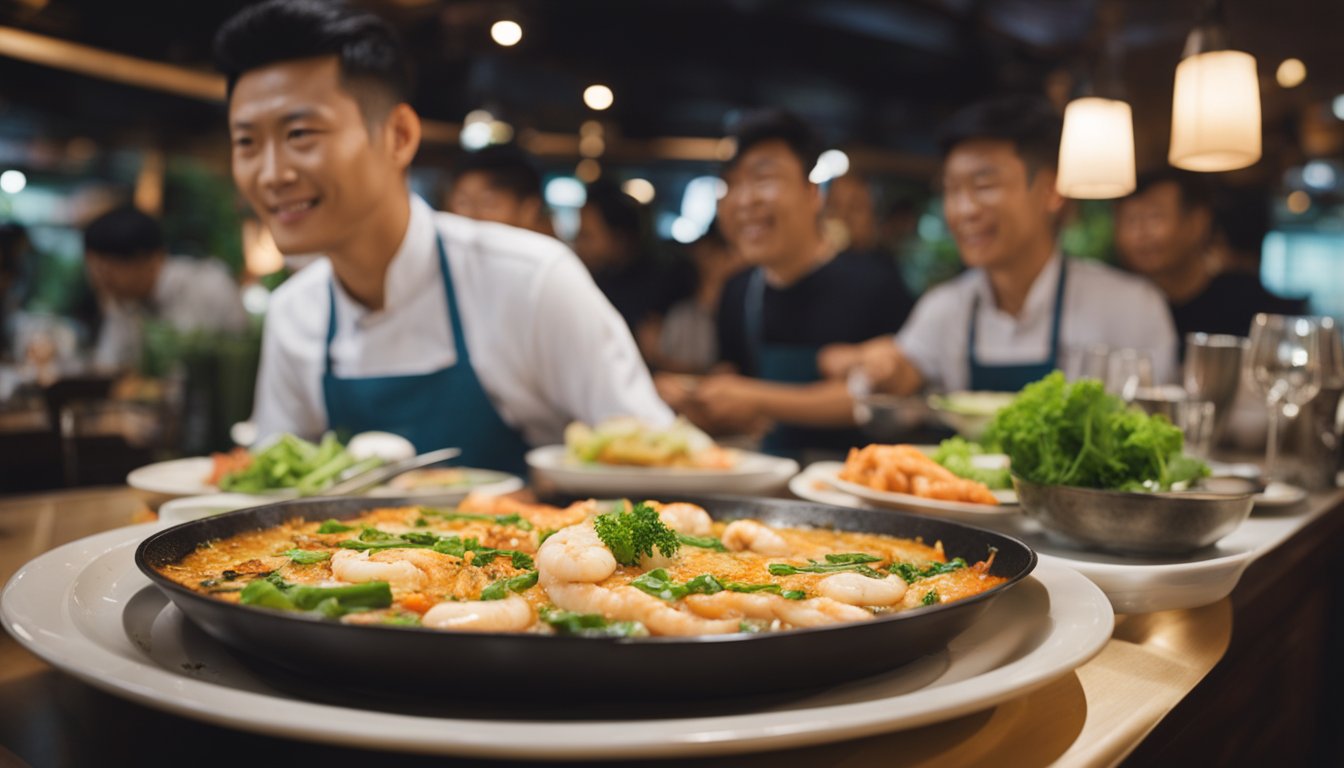
Where can I find the crispiest seafood pajeon in Singapore?
If you're looking for the crispiest seafood pajeon in Singapore, you can head to O.BBa BBQ, a Korean restaurant that's famous for its Korean-style seafood pancake. Another great option is the Korean restaurant, Todamgol, which serves up a delicious seafood pancake that's crispy on the outside and chewy on the inside.
What are the secret ingredients to making an authentic Korean seafood pancake?
The secret to making an authentic Korean seafood pancake lies in the batter. The batter should be made with a mixture of flour, water, and eggs, and should be whisked until it's smooth and free of lumps. To give the pancake a savoury flavour, you can add in scallions, seafood, and other vegetables.
What are some must-try variations of seafood pajeon available in Singapore?
Apart from the traditional seafood pajeon, there are several other variations of this Korean delicacy that you can try in Singapore. One popular variation is the Kimchi Jeon, which is a kimchi pancake that's crispy on the outside and spicy on the inside. Another variation is the Haemul Pajeon, which is a seafood and scallion pancake that's a favourite among seafood lovers.
How do I make my homemade seafood pajeon as scrumptious as Singapore's Korean restaurants?
To make your homemade seafood pajeon as scrumptious as the ones served in Singapore's Korean restaurants, make sure to use fresh ingredients and follow the recipe closely. You can also experiment with different types of seafood and vegetables to give your pancake a unique flavour. Don't forget to cook the pancake on medium heat until it's golden brown and crispy on the outside, and soft and chewy on the inside.
